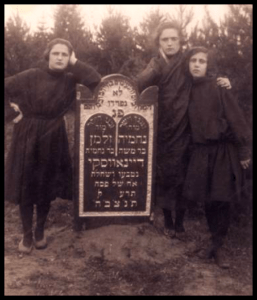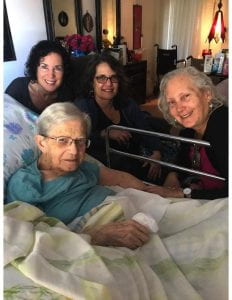Ester Rebeca Shapiro Rok, PhD
(aka Ester R. Shapiro)
TCCS Core Faculty and Associate Professor of Psychology
This current spring semester, I am on sabbatical from teaching. My fourth in nearly 30 years of teaching at UMass Boston, this sabbatical will definitely be my last before retirement.
In 1994, I published Grief as a Family Process: A Developmental Approach to Clinical Practice. Twenty-five years later I am completing my forthcoming book, Culture, Families, Grief and Growth, at a very different time in bereavement studies, clinical practice, and my own life. Following Bluck et al (2014; Shapiro, 2018), I draw on intergenerational reminiscence as time travel both to complete my book and to respond to challenges of my own and my family’s evolving family lives.
Like my own optimistic-immigrant family, I believe in the complex, contested past as a renewable resource in facing new life challenges.
As a scholar of the intergenerational life course, and deeply appreciative of the complexity and contingency of our interdependent selves, I am especially interested in life course transitions as opportunities for creative transformation, identifying existing and new resources even in harsh environments under adverse circumstances.

The three sisters, my paternal grandmother and great-aunts, photographed in 1927 (see photo above) at their father’s and brother’s grave, were commemorating a family loss at the moment they were launching their migrations, one step ahead of the coming Holocaust.
From them, I learned that in times of desperate need, we look harder for inner and outer resources supporting survival and sometimes, unexpectedly, the new learning directs us to thrive through what we call “resilience.”
Looking back on my 65 years of life and nearly three decades as a university professor at UMass Boston, most recently as part of the TCCS community, I feel very fortunate that the formerly bookish girl I once was ended up a teacher and perennial student among students and colleagues both of whom teach me so much.
As a Cuban Eastern European Jewish American immigrant and the first in my family to graduate from college, I had no idea how to prepare for the life of learning I avidly pursued. I did so against the wishes of my immensely practical family who had survived two World Wars, the Holocaust and the Cuban revolution through an unwavering commitment to family loyalty, material security, and a cafeteria-style choose-what-you-like approach to Jewish values.
The TCCS program’s transdisciplinary, community-partnered approach that centers on the questions we want to ask, the honoring of knowledge gained from lived experiences, and our striving to better understand the workings of inequality towards enhancing social justice, have changed the way I write about both societal inequality as a factor and culture as a resource in promoting grief and growth after a loved one’s death.
* * *
Unexpectedly, I am writing this narrative from Hollywood, Florida, where I am taking my turn to accompany my frail, elder parents and support their caretaking team. My 86-year-old mother, Sara (pictured below), is considered a miracle of science by her cardiologist: She has advanced Alzheimer’s disease and a severe heart condition.

Too frail for heart surgery with much of her past no longer accessible, she preserves her deepest habits in her generosity and loving-kindness. She is cared for at home by an affectionate, dedicated team of Latinx-immigrant caretakers whose long hours deprive their own daughters of their mothers’ time.
My 88-year-old father, Jaime, is also present. An old-school Cuban exile patriarch at war with his inexorable aging and anyone who reminds him of his vulnerabilities, he works hard every day to remain in control of the household, the family business which he shares with his 91-year-old brother, and his own precarious health.
My father was born a year after the 1928 photograph of my relatives in Rubezhevich, Poland. Consistent with Jewish custom, his Hebrew name is Nachemie/Consolation, honoring his mother’s deceased father. My grandmother, Basie/Bertha, and her family left for rural Cuba in 1936, sponsored by her sister, Hannah, who was by then married and financially successful.
I was always an avid listener to my family’s stories, and I don’t think it was accidental that both my sisters and I all became family therapists working in Boston’s Latinx communities.
I drew on these family stories from the beginning of my “journey of inquiry,” that is, as a young woman defying my family’s patriarchal script and as a student of socio-politically contextualized family life course transitions.
I was interested in studying the multi-layered developmental processes that facilitated or impeded gender equity.
Completing qualitative studies of gender traditional and non-traditional families and of the adult life-course transition in becoming a first or second-time parents, I graduated from UMass Amherst in 1979 seeking to understand how our family relationships influence who we might become. Working with feminist scholars across disciplines, I learned to appreciate the societal forces and family choreographies guiding our interdependent selves, even while working as a clinical psychologist in a field emphasizing individual experience and biomedical diagnosis. (DSMII, focused on Freudian categories of psychopathology, was being replaced by DSMIII, focused on biomedical diagnosis alongside a “remedicalization” of psychiatry.)
After surviving a harsh internship experience in which my interest in socially-contextualized, developmentally-informed clinical practice was diagnosed as signs of a “borderline personality,” I was fortunate to continue into a postdoctoral training program at Children’s Hospital/Judge Baker Children’s center where faculty members in psychiatry, like Jessica Daniels — now the first African American woman President of the American Psychological Association — and many others remained focused on community-based, socially-informed psychiatry, psychology, social work and nursing as part of social resource/social justice and policy-oriented interdisciplinary teams.
I was fortunate to begin my immersive, challenging and deeply-rewarding learning from the greatest teacher – death – while I was still early in my career in my late 20’s.
I decided to focus on understanding grief and growth as shared life course transitions with special attention on supporting positive-shared development rather than predicting psychopathology.
I had learned from my psychiatric hospital internship to question imposed diagnostic categories in favor of person-centered lived experiences and a respectful, collaborative approach in working towards patient goals. I was supported by teachers and colleagues in the Judge Baker Children’s Center/Children’s Hospital Family Support Center and an extraordinary team focused on how economically-disadvantaged and racially-targeted families drew on social and cultural resources to cope with grief and transform their lives.
They gave me the courage to challenge Freudian and other imposed theories that predicted psychopathology for those that did not “decathect”/detach from the deceased, and to explore emerging sources of knowledge supporting a family-centered developmental perspective focused on who died, how they died, and how we go on with lives informed by loss and preserving family legacies that include culturally meaningful, continuing bonds that are both spiritual and psychological.
Now, at age 65, I write about this learning as a survivor of breast cancer, accompanying my frail, elderly parents and their generation through new forms of aging and death, and learning from my students who have experienced the many intersections of death and social inequality.
My life, the settings in which I practice and teach, and the field of bereavement care within psychotherapy, have been significantly and meaningfully-transformed since I began my studies. As a teacher in both TCCS and our culturally-focused, social justice-informed Clinical Psychology Doctoral program, I think a lot about the sources of knowledge I carry with me which will cross generations and help my students find their own path on their own “journey of inquiry.”
I find that the holistic, social justice-oriented, transdisciplinary approach of TCCS meaningfully supports the challenging work of transdisciplinary synthesis and communicates new knowledge in highly specialized fields including bereavement, traumatic loss, and life course development embracing both suffering and opportunities for healing and transformation.
I was moved to discover that Chicana feminist Gloria Anzaldua credits Carl Jung and his appreciation of cultural archetypes as foundational to her understanding of the step-wise movement from internalized oppression to personal and political transformation (Shapiro and Alcantara, 2016).
I bring this exploration into my TCCS course, Community Health and Equity, where we continue our intergenerational learning.
Within our TCCS and UMASS Boston communities, I appreciate our shared commitments/compromisos to accessible and impactful education, recognizing that teaching and learning in the service of justice expands opportunities for us and for generations to follow.
References
Bluck, S., Alea, N., & Ali, S. (2014). Remembering the historical roots of remembering the personal past. Applied Cognitive Psychology, 28(3), 290-300.
Shapiro, E. (1994). Grief as a Family Process: a Developmental Approach to Clinical Practice. NY: Guilford Press.
Shapiro, E. (2018). Transforming Development through Just Communities:
A Life-Long Journey of Inquiry. In Comas-Diaz, L., and Vasquez, C. (Editors) Latina Psychologists: Thriving in the Cultural Borderlands. NY: Routledge.
Shapiro, E., and Alcantara, D. (2016). Mujerista Creativity: Latin@ Sacred Arts as Life-Course Developmental Resources. In Bryant, T., and Comas Diaz, L. (Eds.). Womanist and Mujerista Psychologies. Washington, DC: APA books.

You must be logged in to post a comment.